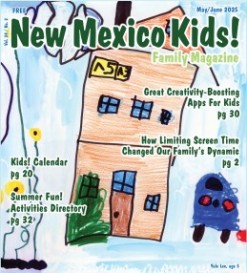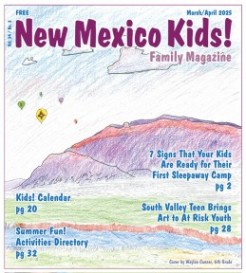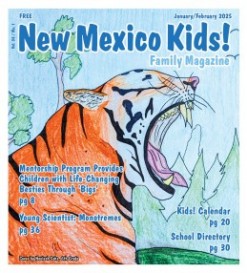Bilingüitos! New Mexico Mom Starts Bilingual Play Group Based on National Model
Bilingüitos! New Mexico Mom Starts Bilingual Play Group Based on National Model
January 25, 2023By EFRAIN VILLA
It is one of those paradoxes we all at some point come to grips with – if one wants help getting something done, one should ask a busy person. Then it would make sense to trust new parents to know how to put their noses to the grindstone and get the hard stuff done. Between routine pediatric appointments, potty training sessions, mealtime meltdowns, not to mention intense bouts of sleeplessness, it is safe to say that new parents are some of the busiest people around.
Perhaps the biggest challenge parents face is determining what type of upbringing will yield the greatest advantage for their children. It can seem like every decision is ultra-charged with significance and can heavily influence a child’s path for the rest of their life.
Is an urban home setting preferable to a rural location for child rearing? Is it OK if infants are formula-fed instead of breastfed? Should kids be homeschooled, and if so, for how long?
For busy Ana Casas-Davila and her husband, both of whom are bilingual in Spanish and English, deciding what language they would use to raise their now 3-year-old daughter was initially a complicated choice. They debated whether it would be wiser to teach her Spanish and English at the same time or whether Spanish or English should be a primary language, with the second language gradually added as she got older and began going to school.
“Primarily it was a cultural decision for us,” said Casas-Davila. “It’s of cultural importance to know where we come from, and I want my daughter to be able to communicate with her grandparents. Yes, they know some English, but it’s not the same as speaking in your native tongue, and none of the other grandchildren know Spanish and can communicate fluently with my mom. Being able to bond with my mom and my husband’s mother was probably even more important than the childhood developmental advantages of being exposed to two languages, which are also obviously very important. When we did research, we came across information on how there is a part of your brain that is developed when you’re learning multiple languages and it helps you in other areas in life. That’s all I had to know to reassure me. I want to give my daughter those tools.”
But even after the Casas-Davilas decided to raise their child in Spanish until she entered pre-school, where she could quickly develop English skills, the resources needed for childhood socialization in Spanish were not easy to find in Albuquerque, where the Casas-Davila family live.
“I was looking for kids her age who were also being brought up in bilingualism, in Spanish, or anything along those lines for playdates or kids’ programs. I tried Facebook groups at first,” Casas-Davila said. “I thought it would be easier but that didn’t yield any results, so I just dug a little deeper and the Bilingüitos website popped up and I thought I had found a solution. As I started scrolling down their website for locations, I got really excited when I saw Albuquerque… and there was nothing. Nothing anywhere near Albuquerque. Not even in the entire state of New Mexico, because at that point I was willing to travel to other cities in the state. That’s how important this was to me.”
According to their website, Bilingüitos, which translates from Spanish to “bilingual little ones,” is a community group founded in 2016 by Kaila Diaz to provide families in Northern Virginia with Spanish language input for their kids through game-based educational programs. It quickly grew and expanded to not only include in-person instruction, but also online resources such as a network for bilingual families and the Bilingual Parenting Podcast as well. In addition to the programs and resources, a community of families sprung up around the shared passion for language.
Their mission is to cultivate and celebrate bilingualism, and to help parents do the same by providing resources that equip parents with the knowledge and tools they need.
In addition to the online resources, Casas-Davila was especially interested in the in-person playdates known as GrupoPLAY Meetups. These playdates have become an integral part of Bilingüitos, and for Casas-Davila, the social opportunities they afforded were especially valuable as the world came out of a years-long pandemic.
The idea behind the playdates is that since kids typically see English as the language of play (due to peer influence, school, etc.), it is important to model Spanish conversations around them. By hearing adults communicate with each other in Spanish, children normalize the language and begin understanding its social value beyond the home. Kids can speak whatever language they prefer during playdates, but the adults are requested to speak only Spanish, even if they are not fluent.
There are currently 24 locations around the United States meeting regularly, but until Casas-Davila began her research, there were none in New Mexico.
In the summer of 2022, she received a lengthy application to determine if she was the right person to lead a group. “I was impressed with the questions they asked because it made me focus on why we were even interested in doing this,” she said. “Why do we want her to be bilingual? How has me being bilingual impacted my life? The more and more I went through the questionnaire, the more validated I felt in wanting to do this.”
By fall, Casas-Davila was ready to begin organizing her first GrupoPlay Meetup in Albuquerque. She posted a notice on her Facebook page, and within 48 hours she had a group. “In the first 10 hours we already had three people interested,” said Casas-Davila. “I was super happy with those first three, but 24 hours later it had grown to 14.”
The playdates take place on the second Saturday of the month and typically last about an hour. Children up to age 12 can participate. Meetings typically take place in public parks but may move indoors in colder weather.
Casas-Davila says parents and caregivers do not have to be fluent in Spanish, but a concerted effort is made to keep all adult communication in Spanish around the children. “The purpose of speaking Spanish is definitely not to alienate anyone, and we welcome Spanish-speaking caregivers of all fluency levels, but we do want to celebrate the language and model it in use, so kids see it’s not just a language that is spoken at home,” she said.
For more information visit Bilinguitos.com/registration




